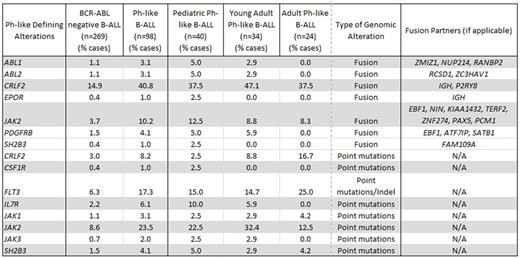Abstract

BACKGROUND: Philadelphia-like B-Acute Lymphoblastic Leukemia (Ph-like B-ALL) shares a similar gene expression profile with BCR-ABL positive B-ALL, but lacks the BCR-ABL fusion. Of all B-ALLs, ~10% of pediatric (<=18), ~30% of young adult (19-39), and ~20% of adult (>=40) B-ALLs are Ph-like. Although Ph-like B-ALL has a poor prognosis with standard of care treatment, case studies have demonstrated responses to targeted therapies, such as inhibitors of JAK or other tyrosine kinases.
Gene expression profiling to identify Ph-like B-ALL is not yet widely available in routine clinical practice and identifying these cases is challenging. However, it has been previously reported that ~80% of Ph-like cases have genomic alterations that activate the JAK-STAT pathway or other kinases, and case studies show that targeting these alterations is a promising strategy for treating these poor risk patients.
DESIGN: 313 cases of B-ALL were evaluated by comprehensive genomic profiling (CGP) for 406 genes via DNAseq for all classes of genomic alterations (GA) and 265 genes via RNAseq for rearrangements, using a CAP-accredited, CLIA-certified, NYS-approved hybrid-capture next-generation sequencing assay (FoundationOne Heme®).
RESULTS: A total of 45/313 samples (14%) had BCR-ABL fusions, with a decreased prevalence likely due to samples having been pre-screened for BCR-ABL by other assays, leaving 268 BCR-ABL-negative B-ALLs. The BCR-ABL positive samples are excluded from the remaining analyses.
The BCR-ABL negative cohort (n=268) was 46% female and 54% male (median age 23 y, range 1-89 y). At least one rearrangement was detected in 163 cases (61%), and the overall mean was 4.1 GA per case. Kinase fusions were detected in 61 cases (22.4%), 56 (20.8%) cases had JAK-STAT pathway activating mutations, and 9 (3.3%) cases had activating mutations in other kinases (Table 1). In total, 98/268 (36.5%) BCR-ABL negative B-ALL cases sequenced had at least one GA consistent with Ph-like B-ALL. Consistent with the known higher rate of Ph-like B-ALL in young adults, 35.1% of pediatric, 45.3% of young adult, and 30% of adult BCR-ABL negative B-ALL cases had Ph-like alterations.
The Ph-like B-ALL cohort (n=98), as defined by GA, was 43% female and 57% male, consistent with prior reports that Ph-like B-ALL is more common in men. The types of alterations present varied by age group. Pediatric and young adult cases more likely harbored kinase fusions (70% and 73.5%), compared to adult cases (50%). Conversely, pediatric cases were least likely to have Ph-like point mutations or indels (50%), compared to young adult and adult cases (65% and 67%). Specifically, adults were more likely to have FLT3 and CRLF2 point mutations/indels, whereas young adults were more likely to have CRLF2 fusions and JAK2 point mutations (Table 1). Of the 98 Ph-like B-ALL cases, 29 (29.6%) also had RAS pathway alterations (KRAS, NRAS, PTPN11, or NF1).
The remaining samples (n=170) - representing BCR-ABL negative, Ph-like alteration negative cases - was 49% female and 51% male (median age 24, range 1-89). GA were most often detected in CDKN2A and/or CDKN2B (33%), TP53 (25%), KRAS (15%), NRAS (14%), or RB1 (11%); ETV6-RUNX1 fusions were identified in 15% of samples.
CONCLUSIONS: Approximately 80% of Ph-like B-ALL cases can be identified by the detection of GA affecting the JAK-STAT pathway or other kinases. Thus, a significant subset of Ph-like B-ALL cases can be identified through CGP that includes extensive fusion detection.
In our cohort, 36.4% of BCR-ABL negative patients had alterations consistent with Ph-like B-ALL, with the highest rate of GA detection in young adults. Improved therapy is critical in this population of patients, who typically fail induction or relapse early with current standard of care therapies. Case studies have reported success in treating patients with Ph-like B-ALL by targeting the driver alteration with inhibitors of JAK or other tyrosine kinases. CGP is currently clinically available as CLIA-certified assays and can be utilized to identify patients with Ph-like B-ALL containing targetable alterations to determine prognosis and identify treatment options.
Severson: Foundation Medicine: Employment, Other: Stock. Gay: Foundation Medicine: Employment, Other: stock. Daniel: Foundation Medicine: Employment, Other: Stock. Elvin: Foundation Medicine: Employment, Other: Stock. Suh: Foundation Medicine: Employment, Other: Stock. Nahas: Foundation Medicine inc: Employment, Other: stockholder. Miller: Foundation Medicine: Employment, Other: Stock. Stephens: Foundation Medicine Inc.: Employment, Equity Ownership. Ross: Foundation Medicine Inc: Employment, Other: stockholder. Ramkissoon: Foundation Medicine: Employment, Other: stock. Vergilio: Foundation Medicine: Employment, Other: Stock.
Author notes
Asterisk with author names denotes non-ASH members.

This icon denotes a clinically relevant abstract


This feature is available to Subscribers Only
Sign In or Create an Account Close Modal